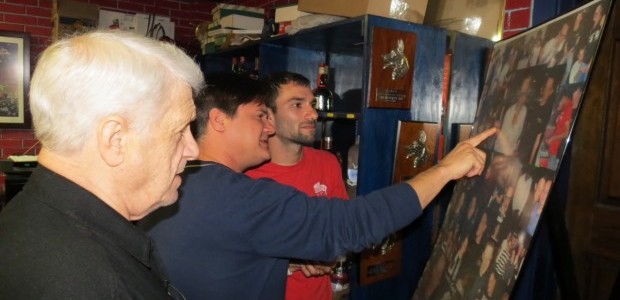
NOAA withdraws TED requirements for shrimpers
December 4, 2012
North Lafourche voters to decide sales tax for flood protection
December 4, 2012When the conviction of Jorrel Young for the 2009 murder of bar manager Robert LeCompte was announced last week, the Houma courtroom where he stood trial was eerily quiet, and the defendant displayed no emotion.
On the faces of some spectators, however, silent tears gave clues to the depth of feeling stirred by Young’s crime and the trial’s outcome. In the hours and days that followed those same people, among the diminutive, bespectacled LeCompte’s closest friends, grappled with conflicting feelings.
There was relief that painful questions were finally answered. There was also a growing understanding that closure does not always bring comfort, nor erase the pain of loss. For those who hold LeCompte and his memory dear, the verdict means if nothing else an opportunity for true healing to begin.
Complicating matters is the status of the Drama Club, the South Hollywood Road bar where LeCompte was murdered, as something more than a tavern to gay, lesbian and transgendered bayou country people, but a safe haven and unique social hub.
Lance Henry, a 30-year-old oilfield service company worker, was one of the club’s first bartenders when entrepreneur Randy Chestnut opened it in 1993, and a close friend of LeCompte.
“I don’t know why I was crying,” Henry said after leaving the courtroom. “When they finally said guilty it was a like a wave came over me. I thought this is final; this is definite. And I guess there was an overwhelming sensation that justice had been served.”
Henry and his boyfriend, Randy Vito, sat beside Chestnut and bartender Ronnie Williams Friday, watching closing arguments presented by Assistant District Attorney Mark Rhodes and defense lawyer Kathryn Lirette.
Calling out the devil
“Jorrel Young is a cold-blooded murderer and a coward,” Rhodes boomed, with the confidence of a back-country preacher, telling jurors that if he could not muster the courage to point at the defendant and “call him what he is,” that he should not expect them to do their duty and convict.
Rhodes ticked off the circumstances that led to Young being singled out as a suspect, that he was the last person known to be in the bar with LeCompte at its Christmas morning closing as well as other details. Young’s own testimony, given against the advice of his attorney, was seized by Rhodes as proof that he was a liar and manipulator, and that he tried to manipulate the jurors themselves.
Robbery, Rhodes said, was clearly the motive for Young to murder a man who had been his friend, who trusted him. The prosecutor then went over the physical evidence he said linked Young to the crime, and he reminded jurors of LeCompte’s reported last words, according to a confession Young gave to girlfriend-turned-informer Darkus Baker, the state’s chief witness.
Rhodes then turned the defense attorney’s claim in opening statements that in this case the “devil was in the details,” as she cautioned jurors to look for reasonable doubt in the case.
“The devil was in this case, but it ain’t in the details,” Rhodes said, shooting an accusing glance at Young. “But he’s in here.”
The friends watched as Lirette gave her closing, poking holes in what she saw as inconsistencies in the prosecution case, challenging jurors to see a disjointed hodgepodge of near-facts rather than a case wrapped up with a bow that would lead to an inescapable verdict of guilty.
The 69-year-old Chestnut winced as Lirette referred to him as an “elderly gentleman” in her closing.
The Drama Club owner had testified during the trial and so, like other witnesses, was barred from being present as the testimony of others was given. Henry and Vito, although subpoenaed, were not called to testify, but were barred as well.
So the summations by the attorneys were all they saw first-hand of the trial.
For Henry and Vito, the murder of LeCompte strikes an especially painful note. On nights when the couple would visit the bar, they would stay late and, if LeCompte was working, they would wait until he closed up.
“It was Christmas, we had plans the next day and left earlier than we would have,” Vito said. “To this day that pains me.”
A Weight Lifted
Jurors returned a verdict in less than two hours, part of which included a re-reading of elements of the charge by District Judge Johnny Walker.
For Williams, a 32-year-old former waiter and offshore oilfield worker, the verdict – along with the focus on Young as a suspect from the get-go, made sense and now does provide some comfort.
“It wasn’t like the verdict was a surprise to me,” said Williams, who saw signs of Young deteriorating before the murder occurred, and knew that he was having financial problems. “I feel like there is some justice in this world. This says you can’t do horrible things like that to people and think you are going to get away with it. A weight has been lifted off the shoulders of me, of this business, and of Robert’s memory. It felt good.”
For Williams, along with others, however, the verdict does little to offset the loss of a friend.
“Him going to jail for the rest of his life is not going to bring Robert back,” said David Verdin, a 30-year-old truck driver who has frequented the Drama Club since it opened.
Energetic and bubbly, upbeat and always ready for a laugh, LeCompte won the hearts of people he worked with and the customers he came to know without ever trying. His small stature caused some to call him the “little elf.”
“He used to prop his leg up on top of the beer cooler and dance,” Verdin recalled. “We would always laugh at that because he couldn’t dance worth a hell.”
Lifelong Loss
Some saw him as a Peter Pan figure who – on the cusp of his 40thbirthday when he died – had vowed never to fully grow up.
“He wanted to be young forever, he never wanted to hit 40,” said Randy Vito, who is aware of the irony. He is also aware – as are many other customers – of the spot near the corner of the blue-tiled bar where LeCompte’s body was found, punctured by 13 wounds from a screwdriver, believed to have been a Phillips head.
The tool-turned-weapon was never recovered.
“Every time I walk in, I know that right there is where he died,” Vito said. “And I look down and I can see it right there. It is very painful and it didn’t make any sense and I still don’t understand. That was a friend and how could a friend do something like that?”
Henry remembers going with LeCompte to the Southern Decadence celebration in New Orleans, the no-holds-barred celebration of gay people held on Labor Day weekend.
“He had never been before,” Henry said. “Me and him went and had a blast and he had it set in his mind that he wanted to carry that rainbow banner. I told him next year we’d come back and he would.”
But for LeCompte, next year never came.
Despite the quirkiness friends adored, LeCompte also had a very serious side, and Chestnut said he couldn’t find a better manager. When he was taken ill, Chestnut said, LeCompte, who lived with him, ran every aspect of the business.
“He ran it like it was his own,” Chestnut said. “On Sundays, when we weren’t even open, he would be in here booking acts for shows. He took care of everything.”
Chestnut said it was his desire to leave the business to LeCompte in the event of something happening to him.
Photos of LeCompte, smiling, joking, clowning, are mounted on an easel in Chestnut’s office. They were used for a memorial service held shortly after his death.
Friday night, Chestnut, Henry and Vito looked and laughed, remembering the good times. For a few moments, pain and confusion were replaced by lightness and laughter. It was something LeCompte would have wanted, they said.
What would have saddened him, they said, was how attendance at the bar fell off sharply after the murder. With no immediate resolution, some customers felt the killing might have resulted from a hate crime.
“I have friends who still won’t come,” said Verdin.
Business continues to drop off.
Here, as in other places, the future relevance of such bars is questioned. Online dating options and the increased acceptance of gay people and culture in mainstream society, some say, erode the importance of such stratification. Williams noted that an increasing number of customers include non-gay couples.
“They like the bartenders, they like the music,” Williams said. “This is the only gay bar in town that still makes it relevant off the top. Though business is not booming, people are still coming.”
Chestnut said the presence of his bar is important, as a symbol that there are many gay people in Houma and the surrounding area, and that the need for such a gathering place will not wither in the long run.
“This club has always been part of the gay community since it opened, and we have always stood up for the rights of gay people here,” Chestnut said. “I do feel we have been kind of abandoned, for whatever reason I can’t understand. But my intention is to stick by the community for better or worse, and not close down so that people are left with the backstreet dumps they went to for years.”
And always, he said, the club will bear the memory of Robert LeCompte.
“Closure and justice being done is one thing,” Chestnut said. “How you feel is different. I know it goes for his family as well. Justice is served but the feeling of loss is something different for anyone who cared for this man. I know that loss will be with me for the rest of my life.”
(From right) Former bartender Lance Henry, his partner Randy Vito and Drama Club owner Randy Chestnut recall slain manager and friend Robert LeCompte Friday night in Chestnut’s office, viewing a collage of photos displayed during his 2009 memorial service.















